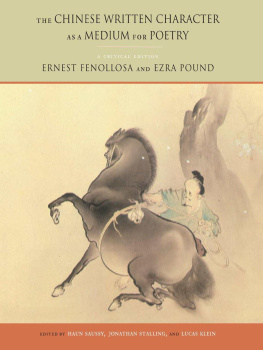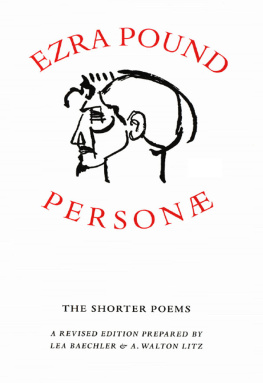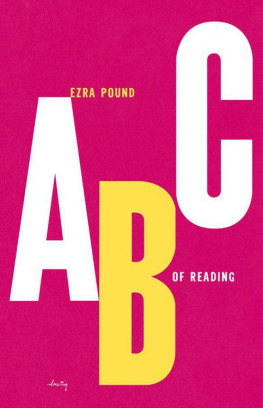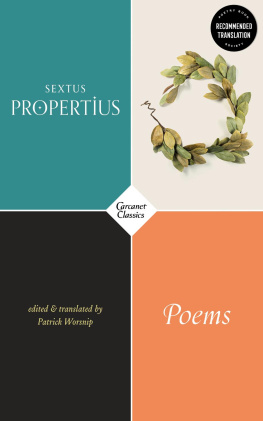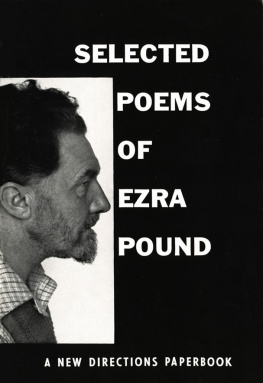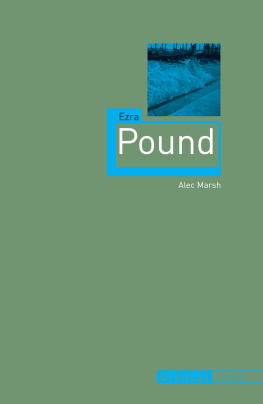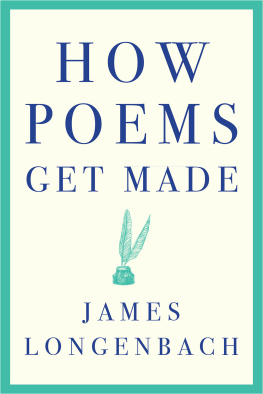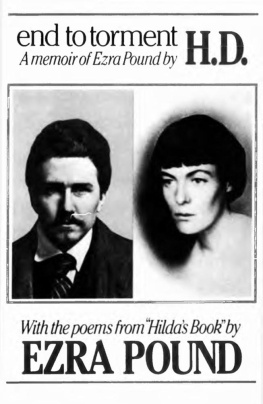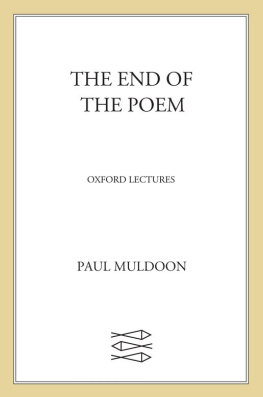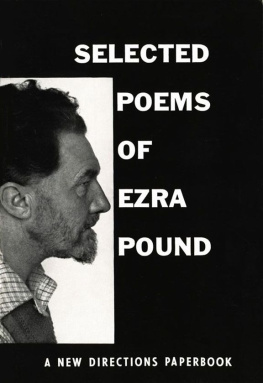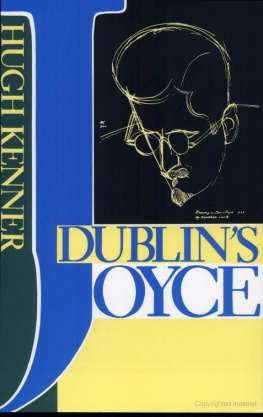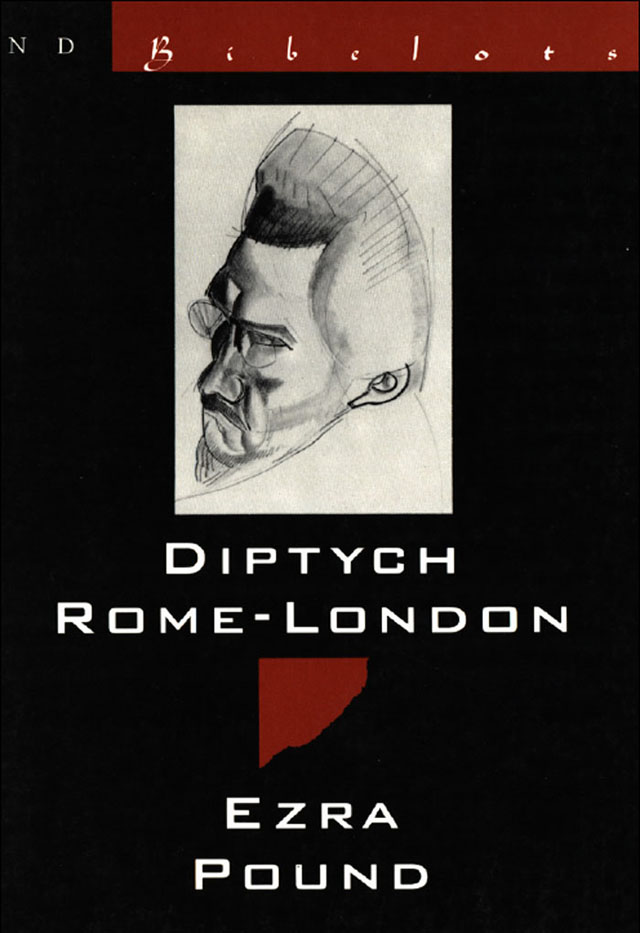I NTRODUCTION
Diptych Rome-London was first published in October 1958 in a sumptuous, limited edition of 200 numbered copies, each signed by the author. It was printed on a hand-press in Verona through the offices of two of Pounds friends and publishers, James Laughlin and Vanni Scheiwiller, with distribution in the United Kingdom by Faber & Faber and in the United States by New Directions. Pound had been released from St. Elizabeths Hospital in April 1958, so
Diptych was in some ways a celebration of his return to Italy. It was also a much-needed reminder of his early achievements at a time when the controversy over the Bollingen Award for
The Pisan Cantos was still fresh in the public mind. Pound had always thought of
Homage to Sextus Propertius and
Hugh Selwyn Mauberley as a diptych, two facing panels that reflect the plight of the poet in a culture shaped by the First World War and the consequences of the Peace.
In a note appended to Mauberley in Personae: The Collected Poems (1926) Pound stated that the sequence is so distinctly a farewell to London that the reader who chooses to regard this as an exclusively American edition may as well omit it and turn at once to page 205 [the opening of Homage to Sextus Propertius], and he once told a friend that Mauberley was the poor mans Propertius. Writing to John Drummond in February 1932, Pound wondered how far the Mauberley is merely a translation of the Homage to S. P., for such as couldnt understand the latter? An endeavour to communicate with a blockheaded epoch. Pound placed the Homage at the end of the 1926 Personae: The Collected Poems along with its date of composition (1917), a clear statement that he regarded this product of the darkest year of the war as the crown of his early poetic life. Of the two poems Hugh Selwyn Mauberley is more central to the development of modern poetrya companion to Eliots The Waste Land and Joyces Ulyssesand it has always been the favorite of the general reader; but Homage to Sextus Propertius is often more admired by those who have followed Pounds early career through all its complex stages of development. In 1914 Ezra Pound, the founder of Imagism and a key figure in the Vorticist movement, felt that he stood at the very center of the London literary world; he believed that he was a member of a small, elite group that could nevertheless have a profound impact on the course of social and literary history.
By 1917 this faith was much diminished, and by 1920 Pound found himself a marginal figure, without power or influence in London. Propertius and Mauberley trace this decline, and provide a bittersweet background to Pounds ultimate decision to leave England for Paris and eventually Italy, where he labored on his long poem containing history, The Cantos, for the next half-century. In July 1916 Pound sent a typical pedagogical letter to the young Iris Barry, laying out an essential reading list for the would-be modern poet. In recommending Catullus and Propertius he remarked in passing: if you CANT find any decent translations I suppose I shall have to rig up something. The next year he did rig up Propertius, but the result was far from conventional translation. Instead he produced a true homage, one poet speaking to another, and learning from another, across the vast space that separated Propertiuss Rome from Pounds London.
In Pounds view, both poets were trying to find a place in a declining empire, with irony and satire as their prime defenses. Annalists will continue to record Roman reputations, Celebrities from the Trans-Caucasus will belaud Roman celebrities And expound the distentions of Empire, But for something to read in normal circumstances? For a few pages brought down from the forked hill unsullied? Like Propertius, Pound feels the pressure of imperial slogans and official literature, but in 1917 he can still respond with light-hearted verve and confidence. The contrast between the Homage and Mauberley is that between a poet who still looks to the future and a poet who can only speak bitterly, though often in beautiful elegiac cadences, of the past and the present. When the Homage was first published many learned readers who took it for an attempt at faithful translation mocked Pounds blunders, and Pounds responseessentially a defense of his modernization of the poemdid not satisfy them. Pound does commit some obvious howlers in his reading of the Latin, but these in no way affect his overall intention, which is to turn Propertius into a mask for the contemporary poet. Homage to Sextus Propertius is an elegant example of the complicated, double transaction between past and present that Eliot would describe two years later in Tradition and the Individual Talent. Homage to Sextus Propertius is an elegant example of the complicated, double transaction between past and present that Eliot would describe two years later in Tradition and the Individual Talent.
The first part of Hugh Selwyn Mauberley was apparently written at great speed in late 1919. It begins with an ironic obituary for the aggressive, Odyssean poet E.P., who For three years, out of key with his time, has sought to resuscitate the dead art / Of poetry; and then proceeds to a delicate, satiric examination of the immediate foreground and background of contemporary English poetry. The weaknesses of the Pre-Raphaelites and the decadent poets of the nineties are recorded with affectionate irony as the inevitable preludes to present-day vulgarity, and in two moving free-verse sections Pound mourns the loss of all those who died in the Great War. There died a myriad, And of the best, among them, For an old bitch gone in the teeth, For a botched civilization E. P. Mauberley was originally subtitled Life and Contacts, but in the 1958 Diptych this was changed to Contacts and Life, as if Pound wished to indicate clearly that Part One deals with the society which surrounded Hugh Selwyn Mauberley, while Part Two is a tracing of his abortive career. Mauberley was originally subtitled Life and Contacts, but in the 1958 Diptych this was changed to Contacts and Life, as if Pound wished to indicate clearly that Part One deals with the society which surrounded Hugh Selwyn Mauberley, while Part Two is a tracing of his abortive career.
Part Two is an ironic reprise, in both style and theme, of Part One, and in it we are presented with the archetypal aesthete who cannot handle the pressures of a hostile environment. Mauberley is both the modern anti-hero in general and Pounds alter ego, a spectre that the poet must exorcise if he is to survive. Just as Joyce in writing The Dead justified his escape from Ireland through the portrait of his alter ego, Gabriel Conroy, so Pound sought to justify his departure from London by externalizing part of his earlier self in the figure of Hugh Selwyn Mauberley. Medallion, the last poem in the sequence, is a brilliant example of a style that Pound would leave behind him in writing The Cantos. It is certainly not, as some critics have claimed, an inferior and ironic companion to the Envoi that closes Part One. We do not have to choose between the two poems: one is a superb example of what can be done with the long singing line, the other a chiselled triumph of sculptural form in words. As T. S. S.
Eliot noted in his Introduction to Pounds Selected Poems (1928), Mauberley is a great poem precisely because it is so firmly rooted in the experiences of one man at one time in one place. It is a summation of Pounds early achievement as a poet, a memorial to the London years, andlike


